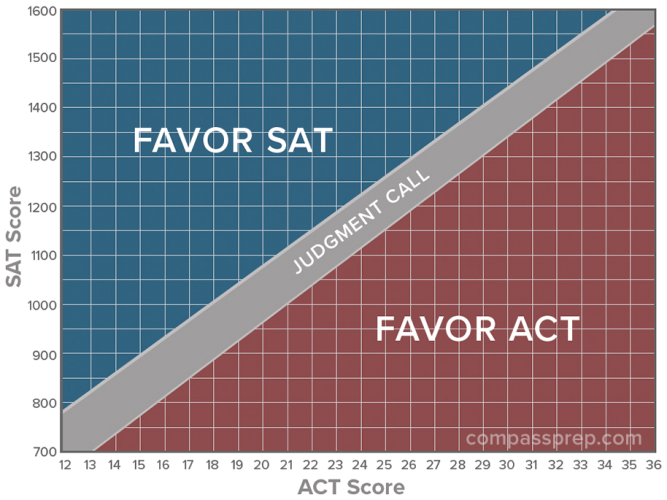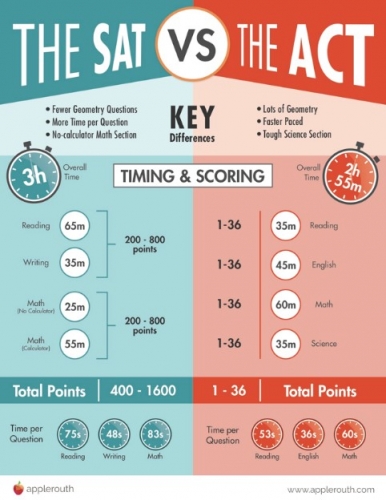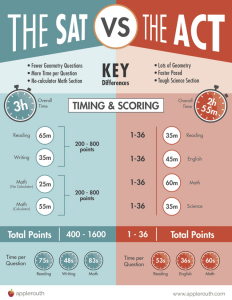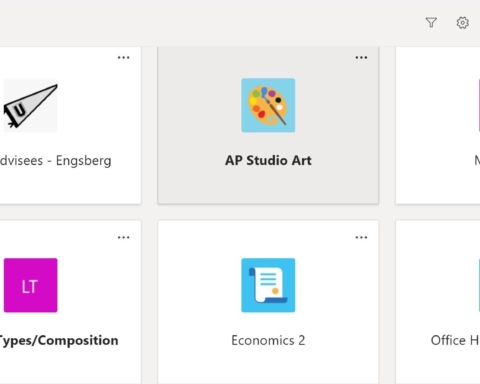You are startled awake at 7:15 a.m. on a Saturday, thinking you just accidentally set a school alarm despite the weekend. Then, you bolt awake, suddenly remembering today is the dreaded ACT day. Scrambling to scrounge up some #2 pencils from the depths of your backpack, you remember the math section and panic, taking the batteries from your family’s TV remote for your calculator. You throw on some sweatpants with your pajama shirt, pray your printer will hurry up and spit out your ACT admission ticket and hop in the car to make it to your testing center by 8 a.m. You plop down at exactly 7:59 a.m. into your assigned seat at an unfamiliar school.
You don’t feel prepared, well-rested or remotely calm about the exam, nor are you in your best possible mental or physical state to achieve your highest possible score. Use the tips and tricks below from some knowledgeable seniors and teachers to make sure this isn’t you.
Why do I even have to take standardized tests?
One of the most dreaded, yet simply inevitable, components of the college admission process is standardized testing. Wesleyan’s Testing Coordinator Meg Brooks explained some of the little-known reasoning behind the necessity of the infamous tests. She said a standardized test “is an objective gauge of students’ learning. It’s on a broader scale from some outside source giving information to students and teachers as to what kind of learning has taken place.”
“Of course,” she continued, “for the college entrance, it’s a necessary evil because there’s no way humanly possible for any university to actually read the 40-something-thousand applications that they get. It’s a way to draw a line—here’s our criteria; you’re either above it or you’re below it. And then they’re going to give attention to those groups who fit their criteria. There’s just no other way to do it.”
Some colleges have claimed they will be eliminating standardized tests from their prerequisites, but Brooks does not see how they could and actually look at all the applications. Plus, “the cost of education would be even more exorbitant than it is because they would have to hire so many more people to actually look at every single person’s application to see where they fall.”
What’s the difference between the ACT and SAT, and which one should I take?
Depending on their aptitudes for certain subjects, students may be more naturally inclined towards one; however, neither test is necessarily harder or more widely accepted at any school. The main difference of the two tests is the pacing of questions. The SAT generally feels longer to test-takers because it “allows much more time per question—almost time and a half,” according to Brooks.
Senior Olivia Frye prefers the ACT and its quicker pacing because of her “short attention span.” Other students enjoy the extra time to thoroughly read through instructions and each question. Senior Kelsey Rappe said, “For me, the ACT felt more rushed and pressure-filled, while the SAT was a test I had time to actually take.”
Overall, Brooks said a student’s choice of taking the ACT or SAT “is really an individual decision.” It just depends on your preference and academic strengths. If you prefer math, the SAT is probably a wise choice, as a fair portion of the test focuses on Algebra II concepts. If you have an affinity for reading and writing, the ACT is probably more compatible for you because the math section only counts for one-fourth of the final score.
Brooks recommends students use their PSAT and Pre-ACT scores to judge how well they will probably do on the real tests. To learn the other differences and find your perfect fit, see the graphic below:
How many times should I take each test and in what year of high school?
There is a myriad of factors that differentiate the two tests, but luckily, there are also numerous ways to ascertain which is right for you. Senior Grade Chair Kendra Morris said, “I think it’s a really good idea to take a full practice test of both and use the conversion charts to compare your scores.” She advises students start with an online mock test at home so that your first, and understandably lower, test scores are not “out there in cyberspace” for colleges to see.
Morris strongly advises to be aware of your timing when taking each test. For example, do not take the ACT until you have completed geometry and preferably some trigonometry, usually learned in pre-calculus. The ACT has a plethora of questions regarding geometry, so if you have not learned the material yet, your score on the math section might be lower than desired.
Brooks suggests students take whichever test they pick at least two times because any time you take a test, a lot of factors, “such as being nervous, running late or your dog eating your admission ticket the night before—as silly and little as they seem—can still affect your performance.”
Senior Lexi Mellott strongly advises all underclassmen to “get your tutoring or classes in so you can aim to be done by the April test date of your junior year. You want to try to avoid having to still take the test your senior year because you will have more on your plate with college applications, and trust me, you will want the ACT/SAT out of the way at that point.”
Should I pay for tutoring or self-teach books?
Practicing is an essential piece of raising your standardized test scores. Frye said, “A lot of people think that practice doesn’t help, but it seriously makes such a difference. I raised my score eight points after tutoring and practice.”
As for whether or not tutoring is the right choice for you, Morris said, “If you’re the kind of person who requires a gym membership to work out, then you need the structure of a class where there is someone who will count you absent or present.” Morris means that if you are an extremely independent and self-disciplined student who will block out an appropriate amount of studying each night for a couple months, tutoring may be a waste of money since you can get all the practice you need online.
Morris said one-on-one tutoring gives “more bang for your buck,” but the student has to be self-disciplining and willing enough to do the homework assigned by a tutor and “take it as seriously as any AP class.” Morris advises that if you choose to pay for lessons, “tutor to your weaknesses and take a balanced approach” to the tests. Determine where your weakest abilities lie and take one-on-one tutoring or find free practice tests and specified tutoring online. Mellott recommends Edison Prep for ACT preparatory classes. She said, “They did an excellent job preparing me for the exam.”
Senior Daniel Baisier said, “Practice is the best strategy.” For the ACT, he recommends the website PrepScholar for critical math formulas and preparing for the writing section. He suggests students watch John Greene’s short “38 Common Spelling and Grammar Errors” video to review for the English portion. Morris said that on the ACT, “The English portion can be a slam dunk if you really know the rules, which raises your composite.”
However, studying or tutoring for standardized tests should never hinder your work ethic in your regular academic classes. Colleges value extracurricular activities, school involvement, class rigor and overall academic performance just as much as standardized test scores, if not more.
Which test-taking tips are actually helpful, and which are time-wasters?
Brooks said the best piece of advice on these tests is to “mark up the test booklet. Underline key words in the directions, so you know exactly what you’re supposed to be answering. Cross off answers that you know aren’t right. Underline key things while you’re reading so that you can easily go back to it.”
A lot of efficient test-takers, Brooks has found, have circled all the answers in the test booklet and copied over on the answer sheet before they turn each page. This method keeps your mind focused on one thing at a time instead of bubbling in an answer after every question. It also helps the student not accidently bubble in the wrong answer on the wrong question.
Baisier suggests students “have some sort of system for flagging questions you aren’t sure about.” If you finish the section early, go back and rethink through the questions that gave you trouble. For the math sections, Baisier said, “If you can do it quickly, try plugging in the answer choices. Remember—it’s multiple choice; the correct answer is there somewhere.”
Pacing is not only important to keep track of during the actual test but during all practice sessions, too. Mellott said students preparing for their test should “sit down and practice doing a section within the time allotted on the exam and try to keep yourself paced to get the hang of it before test day.
“Limit the amount of time you study to 20 or 25 minutes,” said Brooks. Focus on one area of the exam, such as grammar or a certain type of math problem. “Then, take a 10 to 15-minute break. Go walk the dog, go watch a silly video, get a snack. Let your brain absorb the information.” Studying for two hours straight will be much more inefficient than reviewing the information in small, intensely-focused sessions.
Brooks compared the brain to a sponge. If you pour a pitcher of water on a sponge, some of it will absorb the water, but most of it will roll off. Just like a sponge, the brain requires time and patience to let its absorbents sink in, be they water or information. Staggering study sessions with short, physically-active breaks will allow any student, no matter what type of learner he or she is, to comprehend and retain the most information possible.
What’s the most detrimental mistake I can make the day-of or night before a test?
While students are always advised to go to bed early the night before a test, Morris said students shouldn’t “do anything out of the ordinary. Don’t get in bed at 7 p.m. just to stare at the clock for hours.”
Brooks strongly suggests students gather all of their testing materials together the night before. Pack a bag with freshly sharpened #2 pencils, a calculator with new batteries or a full charge and set in the right mode, a snack, water, some form of photo identification and a printed-out test ticket.
Cramming the night before or morning of the test will not help you. Neither will flooding your brain with ACT or SAT tips and tricks. Brooks suggests reserving the night before a test for rest and making sure you are ready to leave in time without feeling rushed.
Most importantly, trust your preparation and have confidence. If you follow these studying and test-taking tips and tricks, you will be set for your standardized tests and whatever academic challenges lie ahead.













